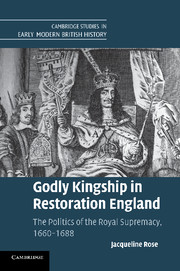Book contents
- Frontmatter
- Contents
- Acknowledgements
- Abbreviations and conventions
- Introduction The Restoration, the Reformation, and the royal supremacy
- Chapter 1 Foundations and legacies: the Reformation and the royal supremacies, 1530–1660
- Chapter 2 The crown and the cavalier Anglicans: prerogative, parliament, and ecclesiastical law
- Chapter 3 Spiritual authority and royal jurisdiction: the question of bishops
- Chapter 4 Dissenters and the supremacy: the question of toleration
- Chapter 5 Anticlericals and ‘Erastians’: the spectre of Hobbes
- Chapter 6 Catholics and Anglicans: James II and Catholic supremacy
- Conclusion
- Bibliography
- Index
Conclusion
Published online by Cambridge University Press: 05 July 2011
- Frontmatter
- Contents
- Acknowledgements
- Abbreviations and conventions
- Introduction The Restoration, the Reformation, and the royal supremacy
- Chapter 1 Foundations and legacies: the Reformation and the royal supremacies, 1530–1660
- Chapter 2 The crown and the cavalier Anglicans: prerogative, parliament, and ecclesiastical law
- Chapter 3 Spiritual authority and royal jurisdiction: the question of bishops
- Chapter 4 Dissenters and the supremacy: the question of toleration
- Chapter 5 Anticlericals and ‘Erastians’: the spectre of Hobbes
- Chapter 6 Catholics and Anglicans: James II and Catholic supremacy
- Conclusion
- Bibliography
- Index
Summary
Between the Act of Appeals in 1533 and the Revolution of 1688, the royal supremacy moved from underpinning the ideology of the monarchical and episcopal ‘establishments’ to undermining them. When Henry VIII broke with Rome, he sought an immediate solution to a pressing problem: the need for a divorce and an heir. His method of doing so seemingly increased the power of English kings to unprecedented heights. Supremacy was created in the 1530s to justify the jurisdictional independence of the English Church from Rome and enhance the judicial, ecclesiastical, and fiscal authority of the crown. In making the monarch supreme governor of the Church, it reflected the early modern assumption that membership of the polity and of the national church went hand in hand. In many ways, that assumption still prevailed in Restoration England. To reject papal authority was a patriotic act in 1688, just as it was in 1588.
- Type
- Chapter
- Information
- Godly Kingship in Restoration EnglandThe Politics of The Royal Supremacy, 1660–1688, pp. 275 - 283Publisher: Cambridge University PressPrint publication year: 2011



